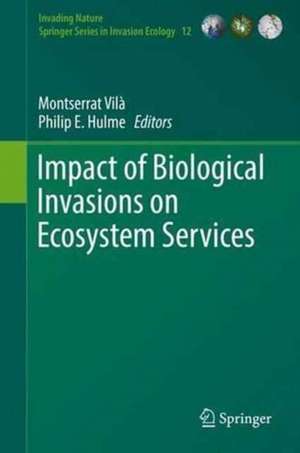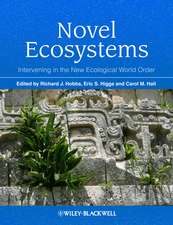Impact of Biological Invasions on Ecosystem Services: Invading Nature - Springer Series in Invasion Ecology, cartea 12
Editat de Montserrat Vilà, Philip E. Hulmeen Limba Engleză Hardback – 22 feb 2017
| Toate formatele și edițiile | Preț | Express |
|---|---|---|
| Paperback (1) | 605.94 lei 38-44 zile | |
| Springer International Publishing – 9 iun 2018 | 605.94 lei 38-44 zile | |
| Hardback (1) | 1013.33 lei 22-36 zile | |
| Springer International Publishing – 22 feb 2017 | 1013.33 lei 22-36 zile |
Preț: 1013.33 lei
Preț vechi: 1235.78 lei
-18% Nou
Puncte Express: 1520
Preț estimativ în valută:
193.95€ • 199.87$ • 163.74£
193.95€ • 199.87$ • 163.74£
Carte disponibilă
Livrare economică 10-24 februarie
Preluare comenzi: 021 569.72.76
Specificații
ISBN-13: 9783319451190
ISBN-10: 3319451197
Pagini: 300
Ilustrații: XXIV, 354 p. 69 illus., 51 illus. in color.
Dimensiuni: 155 x 235 x 23 mm
Greutate: 0.83 kg
Ediția:1st ed. 2017
Editura: Springer International Publishing
Colecția Springer
Seria Invading Nature - Springer Series in Invasion Ecology
Locul publicării:Cham, Switzerland
ISBN-10: 3319451197
Pagini: 300
Ilustrații: XXIV, 354 p. 69 illus., 51 illus. in color.
Dimensiuni: 155 x 235 x 23 mm
Greutate: 0.83 kg
Ediția:1st ed. 2017
Editura: Springer International Publishing
Colecția Springer
Seria Invading Nature - Springer Series in Invasion Ecology
Locul publicării:Cham, Switzerland
Cuprins
1. Introduction.- PART I: Introduction.- 2. Changes in primary production and carbon sequestration after invasion.- 3. Modification of habitat quality and stability by non-native species.- 4. Alteration of nitrogen cycling as a result of invasion.- 5. Hydrological impacts of biological invasions.- Part II: Impacts on provisioning services.- 6. Decreases in crop production by non-native weeds, pests and pathogens.- 7. Impact of non-native pests and pathogens on forestry.- 8. Interference with aquaculture and fisheries.- 9. Impacts of non-native species on livestock and genetic resources.- PART III: Impacts on regulating services.- 10. Displacement and local extinction of native and endemic species.- 11. Infections and diseases in wildlife by non-native organisms.- 12. Non-target effects of biological control agents.- 13. Disruption of pollinator services.- 14. Impact of invasions on water quality in marine and freshwater environments.- 15. Damage toinfrastructures.- 16. Alteration of disturbance regimes.- PART IV: Impacts on cultural services and human well-being.- 17. Spread of vectored non-native human diseases.- 18. Impacts of non-native animal toxins and injuries to human health.- 19. Use of non-native species in developing economies and for poverty alleviation.- 20. Non-native species and the aesthetics of nature.- PART V: Synthesis.
Recenzii
“This is a book worth reading, but also to come back to for reference on several occasions. It could well become one of those core references for the introductory sentences of many papers and proposals on biological invasions stating the impacts of IAS before setting out the more specific research questions.” (Katharina Dehnen-Schmutz, Basic and Applied Ecology, May, 2018)
“All biological invasions on ecosystem services, interdisciplinary collaboration is important for understanding and managing biological invasions to preserve the environmental, economic and societal values of interest (ecosystem services). This book is an important first step towards that goal because it comprehensively advances our understanding of the impact of biological invasions not just on biodiversity and ecosystems, but on the human species as well.” (E. M. Bennett, Biological Invasions, Vol. 20, 2018)
Textul de pe ultima copertă
The book presents an analysis of the ecological, economic and social threats posed by the introduction and spread of non-native species. It provides a comprehensive description of impacts of non-native species from all five kingdoms of life across all ecosystems of the world. New insights into the impacts arising from biological invasions are generated through taking an ecosystem services perspective. This work highlights that management of biological invasions is needed not only to sustain biodiversity and the environment, but also to safeguard productive sectors such as agriculture, forestry and fisheries, as well as to preserve human health and well-being.
Caracteristici
Equips readers with ready access to the latest thinking in ecosystem services as relating to biological invasions Describe a wide range of impacts by non-native microorganisms on a wide range of species including humans Integrates research dispersed across disciplines that is essential for best management of biological invasions Provides a comprehensive information system of the worst invaders to different productive and socio-economic sectors





















